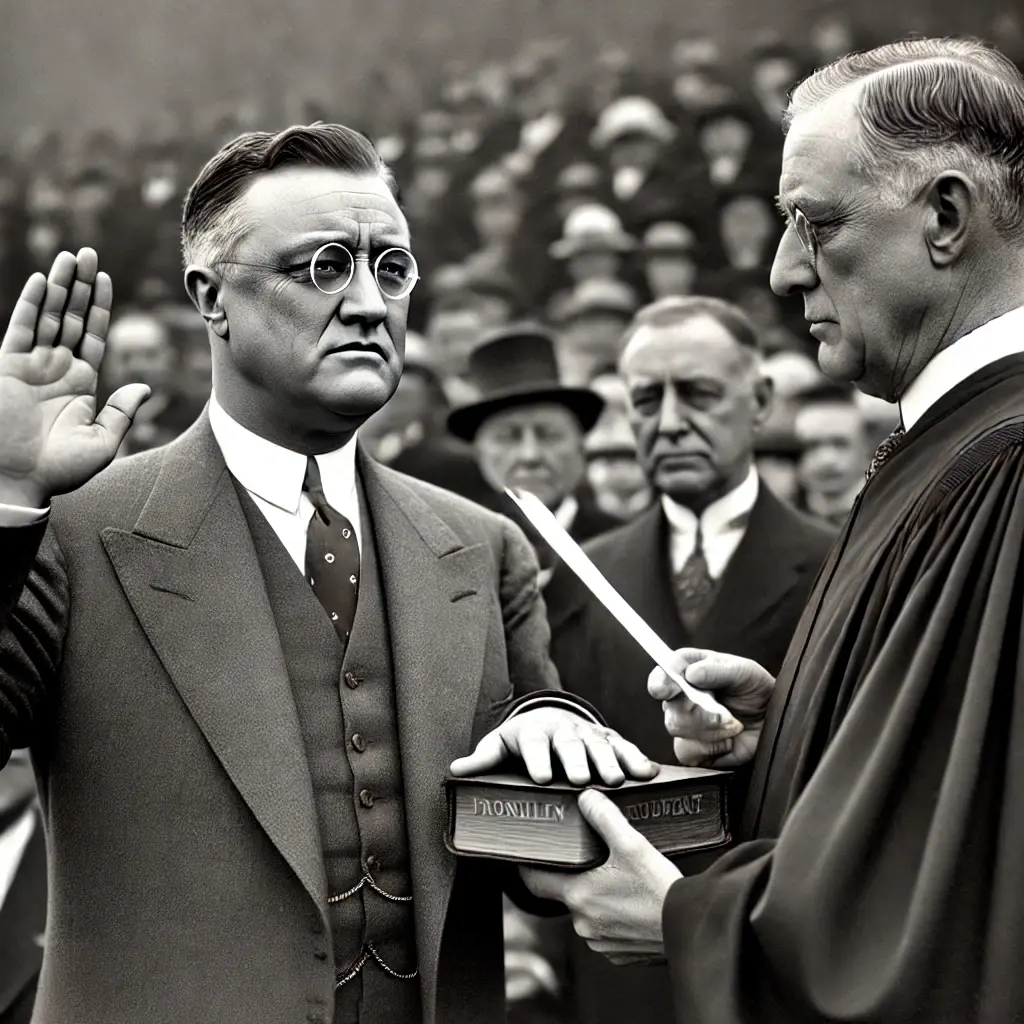Franklin D. Roosevelt’s nomination for an unprecedented third term as U.S. President on July 18, 1940, marked a pivotal moment in American political history. The Democratic Party’s decision to nominate him broke a longstanding tradition established by George Washington, who voluntarily stepped down after two terms. This move came at a critical juncture as Europe was engulfed in World War II, and Roosevelt’s continued leadership was seen as essential for navigating the uncertain times ahead.
Roosevelt’s decision to seek a third term was driven by extraordinary circumstances. The world was in turmoil, with Nazi Germany’s aggressive expansion across Europe and the growing threat posed by the Axis powers. Many Americans believed that FDR’s experienced leadership was crucial to steer the nation through these dangerous times. His administration had already implemented significant domestic reforms through the New Deal, which aimed to recover the U.S. economy from the Great Depression, and his foreign policy expertise was now in high demand.
The Democratic National Convention in Chicago became a defining moment where Roosevelt secured his party’s nomination once again. His acceptance speech emphasized the need for continuity and stability in leadership, particularly in light of the global conflict. Roosevelt’s political skill and popularity played crucial roles in overcoming opposition within his own party and among the public, some of whom were wary of breaking the two-term tradition.
Roosevelt’s third-term campaign was marked by a strong focus on national security and preparedness. The slogan “Don’t change horses in midstream” captured the essence of his campaign, highlighting the necessity of experienced leadership during a crisis. His opponent, Republican Wendell Willkie, criticized FDR’s bid for a third term but ultimately could not overcome Roosevelt’s broad support and the public’s desire for continuity.

The election of 1940 resulted in a decisive victory for Roosevelt, demonstrating the trust and confidence that the American people placed in his leadership. His third term saw the United States move closer to direct involvement in World War II, with policies such as the Lend-Lease Act, which provided critical support to Allied nations. Roosevelt’s leadership during this period was instrumental in shaping the U.S. response to global threats and preparing the nation for eventual participation in the war.
Roosevelt’s unprecedented third term set a significant precedent in American politics. While his leadership was largely seen as necessary during an extraordinary period, it also raised concerns about the potential for prolonged executive power. These concerns eventually led to the ratification of the 22nd Amendment in 1951, which formalized the two-term limit for U.S. presidents, ensuring that future leaders could not seek more than two terms in office.
One of the key aspects of Roosevelt’s third term was his administration’s efforts to bolster national defense. Recognizing the looming threat of the Axis powers, FDR worked tirelessly to strengthen the U.S. military. This included increasing defense spending, expanding the armed forces, and ramping up production of military equipment. These measures were essential in ensuring that the United States was prepared for any eventuality, whether it be direct involvement in the war or supporting Allies through initiatives like the Lend-Lease Act.
On the home front, Roosevelt continued to push forward with New Deal policies aimed at economic recovery and social welfare. Programs like Social Security, unemployment insurance, and various public works projects provided much-needed relief and stability to millions of Americans. These efforts helped maintain public support and confidence in his leadership during a time of great uncertainty.
The attack on Pearl Harbor on December 7, 1941, marked a pivotal moment in Roosevelt’s third term. With the United States now directly involved in World War II, FDR’s leadership was put to the ultimate test. His ability to rally the nation and coordinate the war effort showcased his exceptional political and strategic skills. Under his guidance, the United States became a central force in the Allied effort, contributing significantly to the eventual defeat of the Axis powers.
Roosevelt’s third term also saw significant advancements in civil rights and labor rights, though these efforts were often overshadowed by the war. His administration laid the groundwork for future progress in these areas, setting the stage for the civil rights movements and labor reforms of the post-war era. The Fair Employment Practices Committee (FEPC), established in 1941, aimed to prevent discrimination in the defense industry, marking an early step towards greater equality.
Internationally, Roosevelt’s third term was marked by his close collaboration with other Allied leaders, such as Winston Churchill and Joseph Stalin. The conferences held at Casablanca, Tehran, and Yalta were crucial in planning the strategy and post-war reconstruction efforts. These meetings underscored the importance of Roosevelt’s diplomatic skills and his vision for a post-war world order, which included the establishment of the United Nations.

Roosevelt’s health began to deteriorate during his third term, a fact that he and his administration tried to keep from the public. Despite his declining health, he remained actively involved in both domestic and international affairs, demonstrating his unwavering commitment to his role as President. His ability to continue leading the nation through such a tumultuous period, despite his personal struggles, remains a testament to his resilience and dedication.
The legacy of Roosevelt’s third term extends beyond his immediate impact on the war and domestic policies. His leadership during this critical period helped shape the modern American presidency, emphasizing the importance of strong executive leadership in times of crisis. The decisions made during his third term had long-lasting effects on U.S. foreign and domestic policy, influencing the direction of the country for decades to come.
Roosevelt’s unprecedented third term is often studied for its impact on both domestic and international politics. Domestically, it underscored the flexibility of the American political system in times of crisis. Internationally, it demonstrated the importance of stable and experienced leadership during global conflicts. Roosevelt’s tenure during this critical period left a lasting legacy on the presidency and American political traditions.
Franklin D. Roosevelt’s nomination and subsequent election to a third term highlighted the unique challenges and decisions faced by leaders during times of crisis. His ability to secure and effectively manage a third term in office remains a testament to his political acumen and the trust he garnered from the American populace. The ramifications of his extended presidency continue to influence the structure and function of U.S. executive leadership today.
